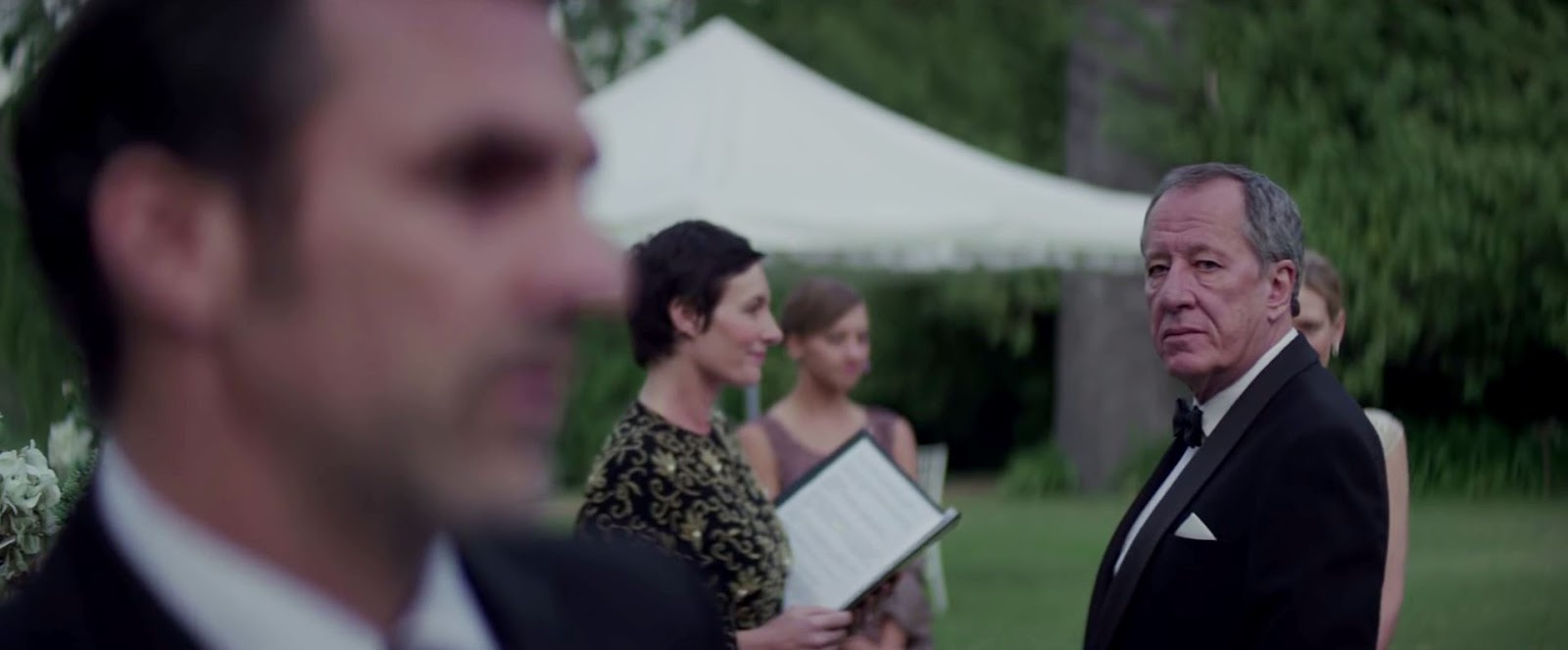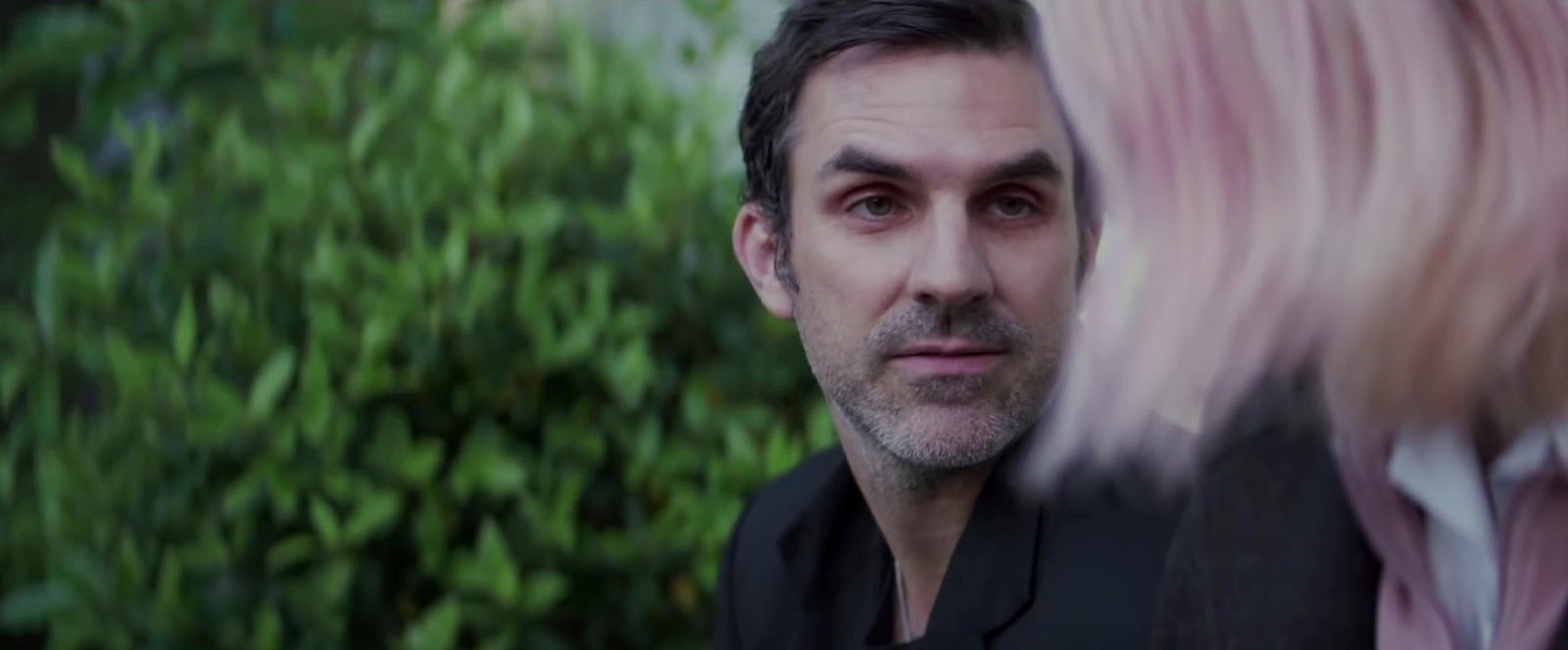
Actor and theatre director Simon Stone staged his modernised version of Henrik Ibsen’s The Wild Duck for Sydney’s Belvoir Street Theatre in 2011, and The Daughter, his debut as a film director, brings that acclaimed project to the big screen. The setting is a rural town where the core industry is the saw mill owned by Henry (Geoffrey Rush), whose family have run the mill for over a century, making them prosperous and powerful in their little baronetcy. But hard times are forcing the closure of the mill, as Henry shamefacedly tells the assembled workers at the outset, immediately threatening the future of the town. The opening shot of the misty, forested hills presents gloomy beauty despoiled with the sound of a gunshot; Henry, an inveterate hunter, has winged a duck which he leaves for his chauffeur (Nicholas Hope) to retrieve. Henry has much on his mind with the fate of the mill and his impending remarriage to his much younger housekeeper Anna (Anna Torv), an event that brings Henry’s estranged son Christian (Paul Schneider) back from the US to the locale where he spent some of his troubled youth. Christian seems far more eager to hang out with his old school pal Oliver (Ewen Leslie) than with his father, whom he still quietly despises and blames for causing the suicide of his mother. Oliver’s own life is wound in tightly with Henry’s however: he’s one of the employees at the mill facing unemployment, his aging, fraying father Walter (Sam Neill) also used to work for Henry, and he’s married to another of Henry’s former housekeepers, Charlotte (Miranda Otto), who now works as a local schoolteacher.

Meanwhile Oliver and Charlotte’s talented daughter Hedvig (Odessa Young), a luminous youth nearing the end of high school, is trying to lose her virginity to her mop-haired boyfriend Adam (Wilson Moore), but he keeps foundering on his own jitters, leaving Hedvig at one point curled up depressed and hiding behind a tree when her family and friends are celebrating her birthday after he can’t get his mojo working amidst the pine needles. The conspiracy of silence that maintains the stability of several of these relationships, as well as younger Hedvig’s sense of identity, is set to be more thoroughly destroyed with calamitous results as her elders face oncoming pivots that will strand them in irretrievable middle age. Christian talks to estranged wife Grace (Ivy Mak) over the phone, hoping she’ll make the flight to be with him for the ordeal by nuptials, but is soon faced with proof their relationship is permanently broken. He falls off the wagon with Oliver, who’s left with searching for a new job, as ready drinking partner: the two men get smashed in the student bar of their old university with a couple of hot-to-trot undergrads, but finish up vomiting up both their self-delusions and their booze in an alleyway. This ritual of purgation proves, instead of an end, to be only an overture to Henry’s wedding, when Christian, stewing after Grace tells him she’s seeing another man, gets fearsomely drunk, visits the scene of his mother’s suicide, and decides to finally tell Oliver a secret that sets disaster in motion: Hedvig is really Henry’s daughter, product of his and Charlotte’s affair, and the real reason Henry has been so unstintingly charitable to him and his clan.

“Serious” Australian filmmaking has been in a bit of a rut in recent years, and The Daughter belongs squarely to a tradition of officially important dramas so preciously polished you can practically smell Brasso, sporting the handful of better-known Australian actors with marquee value. It’s produced by Jan Chapman, who has shepherded some of the more interesting Australian filmmaker debuts of recent years including Love Serenade(1996), Somersault (2004), and The Babadook (2014), and also produced the hallowed middlebrow wonder Lantana(2001). The Daughter retains both the beneficial gloss and the whiff of pseudo-art I associate with that film. Stone’s film, like last year’s much-hyped TV take on Tolstoy, The Beautiful Lie, resets a canonical European literary classic amidst contemporary bourgeois Australian mores. This conceit can either be taken as an attempt to prove that great art adapts to any circumstance, or as the borrowed finery of prestige, used as a short-cut to an audience. This conceit pays off for the most part, however, as The Daughter feels somehow more substantial than many other stabs at this sort of everyday tragedy have lately. You can detect the touch of a master, however mediated by translation and transcription, as the story gains momentum and traces various threads that intersect and create a critical mass of human folly, complete with a Chekhovian gun slipped in for inevitable third act use. DP Andrew Commis’ visuals evoke the workaday small town and its moody environs as a believable substitute for the original play’s Nordic setting, and Stone wields an attentiveness to environment – the hushed shade of woods and the homey, drizzly setting of Oliver’s house, the boxy, aging yet still makeshift-feeling, boarded-up frontages of the town’s main street and the stout colonial permanency of Henry’s house – that grounds the drama in an atmosphere as once tangibly authentic and psychologically pressing. This is a world of superficial egalitarianism masking those who win and those who lose, and the winners, no matter how guilty they feel about it, never mind being winners.

Ibsen’s influence on modern theatre and a specific variety of family drama can’t be underestimated, of course, from Arthur Miller’s Death of a Salesman to Tracy Letts’ August: Osage County. If there are motifs in fare like The Daughter that verge on the over-familiar, it is in part a result of that influence and how it’s defined what we think of as realistic drama (although if we’ve seen one film in the last few years that deals with the resentful progeny of carelessly priapic patriarchs, we’ve seen two dozen, and it’s getting dull; ditto recent Aussie films that all seem to be obsessed with milky-skinned teen girls going through sexual rites of passage, a la Somersault itself). Stone’s adaptation – he wrote the film’s script as well – negotiates the transference of locale and culture skilfully, if not entirely without quibbles. He does push some aspects a little too hard whilst neglecting those that made Ibsen more than a writer of prototypical soap operas. The symbolism inherent in the duck, which is cared for by Walter and eventually freed by Hedvig, perhaps an original touch in Ibsen’s time, feels laboured now. The philosophical strands of the source play are excised, leaving fashionable fixations and quasi-incestuous personal ordeals piling up. Ibsen’s equivalent of Christian, Gregers Werle, was a Hamlet-ish character dedicated to telling the truth however painful in the face of a culture devoted to appearances (something Ibsen himself surely empathised with, and a theme he’d revisit with An Enemy of the People). Something of this idea comes across in Christian’s efforts to be honest, but Stone’s emphasis on melodrama reduces him in the greater part to a self-pitying neurotic who hurts others when he himself is hurting. Stone compensates for the changed focus by trucking in touches pushing for relevance, like changing the play’s model for Henry, Håkon Werle, from a merchant to a mill owner who’s introduced at the outset half-guiltily letting down the working folk he employs, a motif with a certain amount of potent currency in Oz at the moment.

More importantly, Stone’s way with actors helps create a sense of intimacy and emotional volatility that feels genuine even when grazing the edge of histrionics (although the film does lurch over the borderline at least at one point, during Christian’s spiral into a bender). I also, as I often do, had problems with Rush, who gives a stiff, arch performance: he’s never overacting more than when he’s showing off his restraint, and here he tries so hard to seem grave and intense that he forgets to include the superficial charm the character needs. Otherwise the greater pleasure of The Daughter is watching a fine cast sink their teeth into such strong material. Schneider, who did excellent work in the Chapman-produced Bright Star (2009), inhabits Christian with sensitivity to the genuine pain the man experiences whilst also betraying a bratty, permanently emotionally retarded quality that also leads him to inflict pain on others. Neill is customarily good as Walter, who represents the kind of living husk left once a man like Henry is done with you, broken after time spent in jail covering up for a rort he ran on Henry’s behalf. Leslie (one carry-over from the stage version) and Young are most impressive presences, playing the figures here who find themselves blindsided by life-changing information that suddenly and viciously reveals fault lines in their psyches, building to a scene involving the terrible spectacle of moral cowardice and abandonment. I particularly liked the rather Scorsesean moment when Stone tracks Oliver from behind as he advances with a head full of steam, intending dealing wrathful damage to Henry in the midst of wedding party gaiety. This climactic moment segues into bereft diminuendo, as Charlotte, left in a near-deserted pavilion with a couple of lazily dancing couples still dancing to the wedding band, searching for her purse before a servant brings it to her. This is the kind of off-hand yet somehow vital business that elevates a human-scale narrative as much as any number of showy cry-and-shout exchanges. I wouldn’t call The Daughter a game-changing work of contemporary moviemaking, but it is the kind of rock-solid, almost physically compelling drama I’d like to see more of, building and ripping apart a small but deeply felt world with the efficiency of a turbine.





















